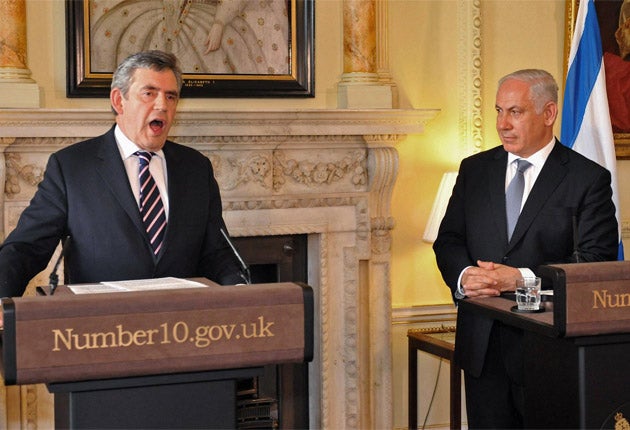Brown breaks Lockerbie silence – up to a point
PM says he is 'repulsed' by Tripoli reception for Megrahi as questions on whether he backed release are sidestepped

Your support helps us to tell the story
From reproductive rights to climate change to Big Tech, The Independent is on the ground when the story is developing. Whether it's investigating the financials of Elon Musk's pro-Trump PAC or producing our latest documentary, 'The A Word', which shines a light on the American women fighting for reproductive rights, we know how important it is to parse out the facts from the messaging.
At such a critical moment in US history, we need reporters on the ground. Your donation allows us to keep sending journalists to speak to both sides of the story.
The Independent is trusted by Americans across the entire political spectrum. And unlike many other quality news outlets, we choose not to lock Americans out of our reporting and analysis with paywalls. We believe quality journalism should be available to everyone, paid for by those who can afford it.
Your support makes all the difference.Gordon Brown yesterday condemned the reception given to the Lockerbie bomber on his return to Libya – but failed to satisfy his critics by refusing to comment on the decision to release Abdelbaset Ali al-Megrahi.
Finally breaking his five-day silence since Megrahi was freed on compassionate grounds, the Prime Minister said he felt "repulsed" by the ceremony which greeted Megrahi in Tripoli. At a Downing Street press conference, he sidestepped questions about whether he agreed with the decision of the Scottish National Party (SNP) administration in Edinburgh to free Megrahi because he has terminal cancer.
Mr Brown insisted that his government had "no role" in the process and said his determination to fight terrorism meant working with countries like Libya. He dismissed suggestions the row would undermine Britain's relationship with the United States, where there is anger about Megrahi's release.
The Prime Minister said: "I was both angry and I was repulsed by the reception that a convicted bomber guilty of a huge terrorist crime received on his return to Libya. When I met Colonel Gaddafi [the Libyan leader] over the summer, I made it absolutely clear to him that we had no role in making the decision about Megrahi's future.
"Because it was a quasi-judicial matter, because it was a matter legislated for by the Scottish Parliament and not by us, it was a matter over which we could not interfere and had no control over the final outcome."
Opposition parties condemned Mr Brown for dodging questions over whether Megrahi's release was right. William Hague, the shadow Foreign Secretary, accused him of a failure of leadership: "He still hasn't said whether or not he was happy with the decision, a decision of huge public concern in this country, of immense international importance, which President Obama and so many other people in other countries have commented on."
Mr Hague tabled Commons questions asking the Government to disclose its contacts with Libya and whether the Megrahi case played any part in negotiations over oil and gas contracts for British firms.
Ed Davey, the foreign affairs spokesman for the Liberal Democrats, said: "As long as Gordon Brown remains silent on this issue, people will suspect he has something to hide. It is hard to see why he can't tell us what he thinks of the decision to release a man who has been convicted of the worst terrorist attack in British history."
Brian Wilson, a former Labour minister, said Mr Brown's "Trappist silence" on the question was "pretty odd" and he was "in danger of being held up to ridicule".
Brown aides denied he was playing politics and insisted that passing judgement on the decision would only imply that the UK Government had a role in it. However, the suspicion at Westminster is that he is refusing to give his view in an attempt to avoid upsetting either the US or Libya – and is hoping the SNP will instead pay a political price.
There were further claims that the UK Government did play a part in the process leading to Megrahi's release. The Scottish Government, which plans to release documents about the affair within days, said: "The only obstacle to publishing material has come from the UK Labour government, who previously failed to grant permission to publish their communications to us regarding the prisoner-transfer agreement, and we hope that they will now support disclosure."
Labour and Tory MSPs claimed that Megrahi could live longer than the three months cited in a medical report issued last week, which had provided the grounds for his release.
Join our commenting forum
Join thought-provoking conversations, follow other Independent readers and see their replies
0Comments